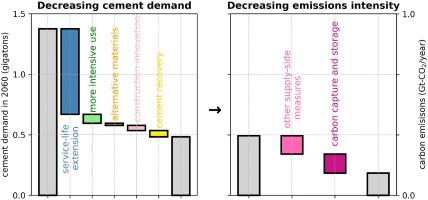将碳捕集与封存纳入中国水泥行业的脱碳进程
IF 16.3
1区 工程技术
Q1 ENERGY & FUELS
引用次数: 0
摘要
中国到2060年实现碳中和的目标促使难以消减的水泥行业认真考虑深入部署碳捕集与封存(CCS)技术。然而,CCS在多大程度上应被纳入中国水泥行业的脱碳途径,并与供应方和需求方的减排努力相结合,这一点尚未得到很好的理解。本研究综合了供应方和需求方的转型动态,系统地评估了CCS在这些去碳化途径中的作用。研究结果表明,到2060年,通过提高需求方的材料效率,水泥年需求量可从每年1.4千兆吨降至每年0.5千兆吨。此外,通过大规模的二氧化碳捕集与封存(CCS)部署和其他供应方措施,到2060年,水泥行业的二氧化碳总排放量可从每年0.2亿吨到0.8亿吨减少到每年约0.1亿吨。根据需求方和供应方战略的综合努力,所需的CCS能力将从每年9.01亿吨熟料产量减少到1.52亿吨。此外,预计总经济成本为 9.7-12.8 万亿元人民币,每减少一吨二氧化碳的减排成本为 156-228 元人民币,高于中国目前的碳价格。这些研究结果清楚地表明,如果从需求方和供应方两方面充分挖掘减排潜力,依靠二氧化碳捕集与封存技术可以显著减少碳排放。本文章由计算机程序翻译,如有差异,请以英文原文为准。

Incorporating carbon capture and storage in decarbonizing China's cement sector
China's target of carbon neutrality by 2060 has prompted the hard-to-abate cement sector to seriously consider the deep deployment of carbon capture and storage (CCS) technologies. However, the extent to which CCS should be integrated into the decarbonization pathways of China's cement sector, within a nexus of supply- and demand-side mitigation efforts, is not yet well understood. This study integrates supply- and demand-side transition dynamics to systematically assess the role of CCS in these decarbonization pathways. The results indicate that annual cement demand can be reduced from 1.4 gigatons (Gt) per year to 0.5 Gt per year by 2060 through a series of material efficiency improvements on the demand side. Furthermore, total carbon dioxide emissions from the cement sector could decrease from 0.2 to 0.8 Gt CO2 per year to approximately 0.1 Gt CO2 per year by 2060, with large-scale CCS deployments and other supply-side measures. The required CCS capacity would decrease from 901 to 152 million tons of clinker production per year, depending on the combined efforts from both demand- and supply-side strategies. Additionally, total economic costs are projected to be 9.7–12.8 trillion Chinese yuan (CNY), with mitigation costs ranging from 156 to 228 CNY per ton of CO2 avoided, which is higher than current carbon prices in China. These findings clearly demonstrate that reliance on CCS can significantly reduce carbon emissions if mitigation potentials are fully capitalized from both the demand- and supply-side efforts.
求助全文
通过发布文献求助,成功后即可免费获取论文全文。
去求助
来源期刊

Renewable and Sustainable Energy Reviews
工程技术-能源与燃料
CiteScore
31.20
自引率
5.70%
发文量
1055
审稿时长
62 days
期刊介绍:
The mission of Renewable and Sustainable Energy Reviews is to disseminate the most compelling and pertinent critical insights in renewable and sustainable energy, fostering collaboration among the research community, private sector, and policy and decision makers. The journal aims to exchange challenges, solutions, innovative concepts, and technologies, contributing to sustainable development, the transition to a low-carbon future, and the attainment of emissions targets outlined by the United Nations Framework Convention on Climate Change.
Renewable and Sustainable Energy Reviews publishes a diverse range of content, including review papers, original research, case studies, and analyses of new technologies, all featuring a substantial review component such as critique, comparison, or analysis. Introducing a distinctive paper type, Expert Insights, the journal presents commissioned mini-reviews authored by field leaders, addressing topics of significant interest. Case studies undergo consideration only if they showcase the work's applicability to other regions or contribute valuable insights to the broader field of renewable and sustainable energy. Notably, a bibliographic or literature review lacking critical analysis is deemed unsuitable for publication.
 求助内容:
求助内容: 应助结果提醒方式:
应助结果提醒方式:


